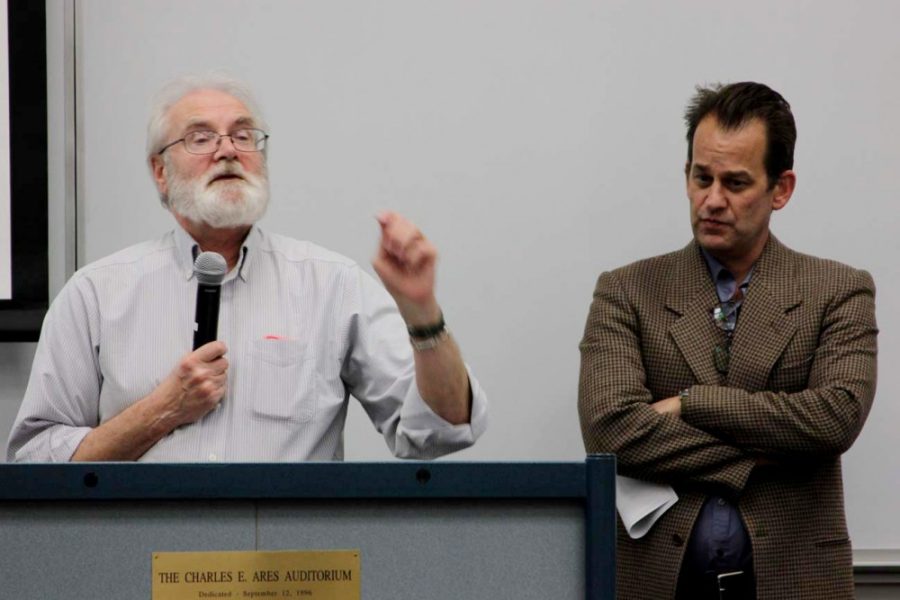Faculty leaders pushed for new guidelines for merging departments or colleges at the UA at this month’s Faculty Senate meeting.
UA President Ann Weaver Hart and Provost Andrew Comrie also told faculty what they’re doing to implement Never Settle, the UA’s academic strategic plan.
Robert Mitchell, vice chair of the faculty, and Michael Brewer, chair of the Academic Personnel Policy Committee, presented a draft of new guidelines at the Faculty Senate meeting on Monday.
The senate will continue discussing the proposal in its next meeting, as some questions about faculty voting were brought up in the discussion.
Mitchell and Brewer proposed that colleges or departments form a committee made up of administrators and faculty members when an administrator suggests merging two departments or colleges.
Rather than taking an idea to merge two departments to the faculty of both departments for a vote, Mitchell said he would like to have a committee discuss earlier how the merging will affect faculty and what the reasons for wanting to merge might be.
“Anybody that’s got an idea, work with your faculty counterparts or administrative counterparts, get everybody on the same page [to] understand the pros and cons,” Mitchell said. “And don’t just say, ‘Here, I want to merge mortuary sciences and Scandinavian literature,’ or whatever.”
Brewer said the proposal will make the merging process more productive and make the voting process more effective by taking care of the necessary discussion before the vote.
“This is a document that ensures that there is faculty participation,” Brewer said, “and is designed to create engagement with the faculty.”
Hart also presented at the meeting and told the Faculty Senate what to expect during the implementation of Never Settle, the UA’s academic strategic plan. Hart said the Never Settle presentation to the Arizona Board of Regents went “extremely well” but that the real challenge will be to stay on track as the plan moves forward.
Comrie said he has been meeting with deans and senior administrators of individual colleges and departments to ensure Never Settle is properly implemented.
“The behind-the-scenes work to actually really start putting some teeth into that plan and actually do it -— it is, after all, a giant to-do list for the whole university,” Comrie said. “That is what we’re working on right now.”
Hart also reminded the senate that in order for the plan to work, the state Legislature would have to approve two budget requests from the board of regents. One of the requests is for an investment of $1 billion for research infrastructure for the three state universities, $450 million of which would be allocated to the UA. The second request is for $107 million for general funds.
UA leaders have also been working with the UA Office of Federal Relations to discuss solutions to the budget sequestration, a series of spending cuts to the federal government as the cuts will continue to affect research funding, Hart said.
“This second round will be far more devastating to our research funding than this year’s round,” Hart said, “because it proportionately cuts into a greater slice of the major funders’ support.”
Hart added that university leaders are unsure how the sequestration might affect Pell Grants or student veterans, but they are pressuring state representatives to communicate with the federal government to try to prevent the government from shutting down again.
“We’re actively engaged,” Hart said. “Everybody’s frustrated, but we will try and keep you updated as much as we can and the whole higher ed. community has marshaled its forces to try and get Congress to take some action.”
– Follow Stephanie Casanova @_scasanova_









